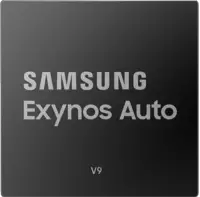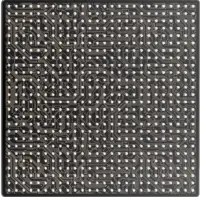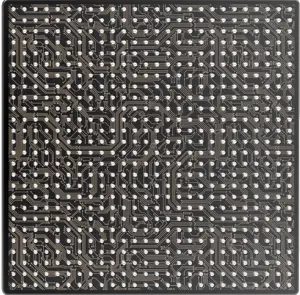From WikiChip
Difference between revisions of "samsung/exynos auto/v9"
| (7 intermediate revisions by 2 users not shown) | |||
| Line 2: | Line 2: | ||
{{chip | {{chip | ||
|name=Exynos Auto V9 | |name=Exynos Auto V9 | ||
| − | |image=exynos auto v9 ( | + | |image=exynos auto v9 (front).png |
| − | |back image=exynos auto v9 ( | + | |back image=exynos auto v9 (back).png |
|designer=Samsung | |designer=Samsung | ||
|designer 2=ARM Holdings | |designer 2=ARM Holdings | ||
| Line 16: | Line 16: | ||
|microarch=Cortex-A76 | |microarch=Cortex-A76 | ||
|core name=Cortex-A76 | |core name=Cortex-A76 | ||
| + | |process=8 nm | ||
|technology=CMOS | |technology=CMOS | ||
|word size=64 bit | |word size=64 bit | ||
| Line 21: | Line 22: | ||
|thread count=8 | |thread count=8 | ||
}} | }} | ||
| − | '''Exynos Auto V9''' is a {{arch|64}} [[octa-core]] [[ARM]] SoC introduced by [[Samsung]] for automotive infotainment applications. Fabricated on Samsung's own [[8 nm process]], the V9 features eight {{armh|Cortex-A76|l=arch}} cores and a [[safety island]] core that supports Automotive Safety Integrity Level (ASIL)-B standards. This chip integrates the [[Mali G76]] GPU as well as a [[neural processing unit]]. | + | '''Exynos Auto V9''' is a {{arch|64}} [[octa-core]] [[ARM]] SoC introduced by [[Samsung]] for automotive infotainment applications. Fabricated on Samsung's own [[8 nm process]], the V9 features eight {{armh|Cortex-A76|l=arch}} cores operating at up to 2.1 GHz and a [[safety island]] core that supports Automotive Safety Integrity Level (ASIL)-B standards. This chip integrates the [[Mali G76]] GPU as well as a [[neural processing unit]]. |
| + | |||
| + | == Cache == | ||
| + | {{main|arm holdings/microarchitectures/cortex-a76#Memory_Hierarchy|l1=Cortex-A76 § Cache}} | ||
| + | {{cache size | ||
| + | |l1 cache=1 MiB | ||
| + | |l1i cache=512 KiB | ||
| + | |l1i break=8x64 KiB | ||
| + | |l1i desc=4-way set associative | ||
| + | |l1d cache=512 KiB | ||
| + | |l1d break=8x64 KiB | ||
| + | |l1d desc=4-way set associative | ||
| + | |l1d policy=write-back | ||
| + | |l2 cache=2-4? MiB | ||
| + | |l2 break=8x256/512 KiB | ||
| + | |l2 desc=8-way set associative | ||
| + | |l2 policy=write-back | ||
| + | |l3 cache=? MiB | ||
| + | |l3 break=2x? MiB | ||
| + | |l3 desc=16-way set associative | ||
| + | }} | ||
| + | |||
| + | == Memory controller == | ||
| + | {{memory controller | ||
| + | |type=LPDDR4-???? | ||
| + | |type 2=LPDDR5-???? | ||
| + | }} | ||
| + | |||
| + | == Graphics == | ||
| + | {{integrated graphics | ||
| + | | gpu = Mali-G76 | ||
| + | | device id = | ||
| + | | designer = ARM Holdings | ||
| + | | execution units = ? | ||
| + | | max displays = 6 | ||
| + | | max memory = | ||
| + | | frequency = ? | ||
| + | |||
| + | | direct3d ver = 12 | ||
| + | | opencl ver = 2.0 | ||
| + | | opengl ver = 3.2 | ||
| + | | opengl es ver = 3.2 | ||
| + | | vulkan ver = 1.1 | ||
| + | | openvg ver = 1.1 | ||
| + | }} | ||
== Audio == | == Audio == | ||
* [[Tensilica]] HiFi 4 DSP | * [[Tensilica]] HiFi 4 DSP | ||
Latest revision as of 12:26, 30 May 2020
| Edit Values | |
| Exynos Auto V9 | |
 | |
| General Info | |
| Designer | Samsung, ARM Holdings |
| Manufacturer | Samsung |
| Model Number | V9 |
| Introduction | January 3, 2018 (announced) January 3, 2018 (launched) |
| General Specs | |
| Family | Exynos Auto |
| Frequency | 2.1 GHz |
| Microarchitecture | |
| ISA | ARMv8.2 (ARM) |
| Microarchitecture | Cortex-A76 |
| Core Name | Cortex-A76 |
| Process | 8 nm |
| Technology | CMOS |
| Word Size | 64 bit |
| Cores | 8 |
| Threads | 8 |
| Packaging | |
 | |
Exynos Auto V9 is a 64-bit octa-core ARM SoC introduced by Samsung for automotive infotainment applications. Fabricated on Samsung's own 8 nm process, the V9 features eight Cortex-A76 cores operating at up to 2.1 GHz and a safety island core that supports Automotive Safety Integrity Level (ASIL)-B standards. This chip integrates the Mali G76 GPU as well as a neural processing unit.
Contents
Cache[edit]
- Main article: Cortex-A76 § Cache
|
Cache Organization
Cache is a hardware component containing a relatively small and extremely fast memory designed to speed up the performance of a CPU by preparing ahead of time the data it needs to read from a relatively slower medium such as main memory. The organization and amount of cache can have a large impact on the performance, power consumption, die size, and consequently cost of the IC. Cache is specified by its size, number of sets, associativity, block size, sub-block size, and fetch and write-back policies. Note: All units are in kibibytes and mebibytes. |
|||||||||||||||||||||||||||||||||||||
|
|||||||||||||||||||||||||||||||||||||
Memory controller[edit]
|
Integrated Memory Controller
|
||
|
||
Graphics[edit]
|
Integrated Graphics Information
|
||||||||||||||||||||||||||||||||
|
||||||||||||||||||||||||||||||||
Audio[edit]
- Tensilica HiFi 4 DSP
Facts about "Exynos Auto V9 - Samsung"
| back image |  + + |
| base frequency | 2,100 MHz (2.1 GHz, 2,100,000 kHz) + |
| core count | 8 + |
| core name | Cortex-A76 + |
| designer | Samsung + and ARM Holdings + |
| family | Exynos Auto + |
| first announced | January 3, 2018 + |
| first launched | January 3, 2018 + |
| full page name | samsung/exynos auto/v9 + |
| has ecc memory support | false + |
| instance of | microprocessor + |
| integrated gpu | Mali-G76 + |
| integrated gpu designer | ARM Holdings + |
| isa | ARMv8.2 + |
| isa family | ARM + |
| l1$ size | 1,024 KiB (1,048,576 B, 1 MiB) + |
| l1d$ description | 4-way set associative + |
| l1d$ size | 512 KiB (524,288 B, 0.5 MiB) + |
| l1i$ description | 4-way set associative + |
| l1i$ size | 512 KiB (524,288 B, 0.5 MiB) + |
| l2$ description | 8-way set associative + |
| l3$ description | 16-way set associative + |
| ldate | January 3, 2018 + |
| main image |  + + |
| manufacturer | Samsung + |
| microarchitecture | Cortex-A76 + |
| model number | V9 + |
| name | Exynos Auto V9 + |
| process | 8 nm (0.008 μm, 8.0e-6 mm) + |
| supported memory type | LPDDR4-???? + and LPDDR5-???? + |
| technology | CMOS + |
| thread count | 8 + |
| word size | 64 bit (8 octets, 16 nibbles) + |